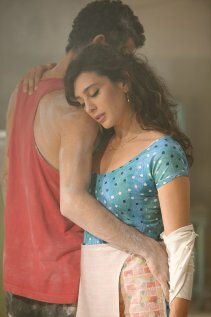Racial, religious and political tensions are one of many concurrent themes at Cannes 2011 (as with film in general), with a new initiative fittingly portraying the recent turbulence in the Middle East through the eyes of in the film Where Do We Go Now? After her debut Caramel (2007), Lebanese film-maker Nadine Labaki has a very strong take on her home country and its own cultural issues, where she blends less of the serious stuff into more of the light-hearted.
What she tackles is not unimportant, however. The ongoing divide between Christians and Muslims across her country continues to hold a threat to many caught helplessly in the middle, and Labaki looks to a small village (of an unnamed location) to tell her story of how the growing hatred could be avoided. Ladies of the area come together to discuss the gossip of the day, namely why Christian shop owner Amal (Labaki) and Muslim man Rabih (Julien Farhat) haven’t declared their love yet. Sure there’s the divide, but no-one cares here. The priest and imam are best buddies and the kids all play together in the street. When riots start happening in nearby regions, Amal doesn’t want the town to get wind of it, least of all Rabih – but once it infiltrates and tensions rise, the ladies go to entertainingly extreme measures to make sure nothing eventuates. It’s the human nature of living in a small area, as is Labaki’s viewpoint of the female perspective. She demonstrates how men are more susceptible to violence as a way of resolving problems, ultimately conveying the stupidity of the current conflicts and her disdain for the mindset of a minority within her country and beyond.
![Where Do We Go Now? [Et maintenant, on va ou?] (Review) wdwgn3 600x417 Where Do We Go Now? [Et maintenant, on va ou?] (Review)](/wp-content/uploads/wdwgn3-600x417.jpg) “War is utter absurdity, an evil that we inflict upon ourselves for nothing, or at least for things that are not worth killing ourselves over.” – Nadine Labaki
“War is utter absurdity, an evil that we inflict upon ourselves for nothing, or at least for things that are not worth killing ourselves over.” – Nadine Labaki
The use of song as the only inkling of affection between Amal and Rabih is surprisingly welcome. It’s a tender moment in Where Do We Go Now? that isn’t irrelevant nor alone in its aesthetic. Labaki uses songs sparingly to lighten the mood and give some humour to the surroundings, with these sequences — inspired by childhood viewings of Grease and Cinderella — working remarkably well considering the overwhelming majority of her cast are non-actors. But they’re definitely lively, as is Lebaki, who handles her many roles — writer, director and actor – impossibly well, blending drama and comedy seamlessly with little apparent effort. Her ties with the crew of the film no doubt helped the production along; sister Caroline also acted as the costume designer, while her collaboration with prominent French producer Anne-Dominique Thoussaint has continued after Caramel. Fittingly, with numerous ties unfinished, Labaki’s sophomore effort is an absolute joy to watch that evokes both laughter and tears. Her ability to jostle you around emotionally in this film that resonates the most as you depart the cinema.
—
For more of Katina’s coverage of the 2011 Cannes film festival, click here.
 Follow the author Katina Vangopoulos on Twitter.
Follow the author Katina Vangopoulos on Twitter.

![Where Do We Go Now? [Et maintenant, on va ou?] (Review)](/wp-content/uploads/wdwgn2-700x466.jpg)

![HEADER_VARIANTE-1-FINAL HEADER VARIANTE 1 FINAL 600x73 Where Do We Go Now? [Et maintenant, on va ou?] (Review)](/wp-content/uploads/HEADER_VARIANTE-1-FINAL-600x73.jpg)




![Egyptian revolution hits Cannes with 18 DAYS [TAMANTASHAR YOM] Egyptian revolution hits Cannes with 18 DAYS [TAMANTASHAR YOM]](/wp-content/uploads/18_days-840234165-large1-e1305960574972-150x150.jpg)








